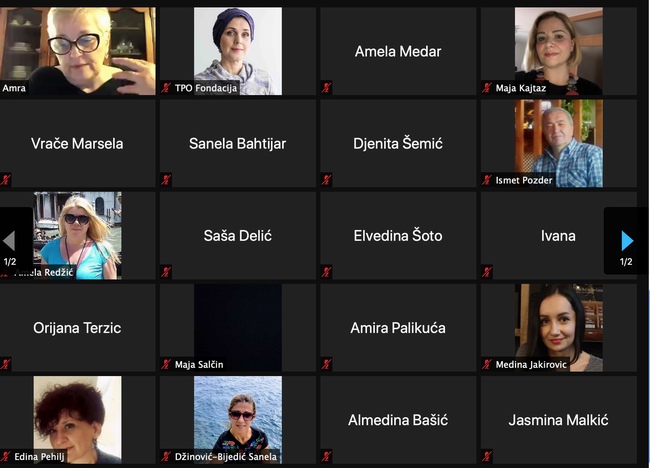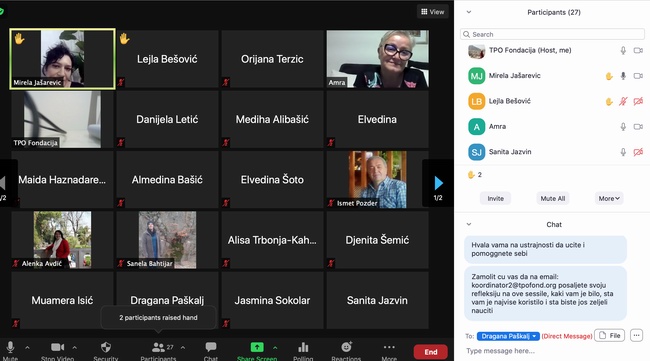April-June 2021
PSYCHOSOCIAL SUPPORT FOR TEACHERS

During the pandemic, everyone was in need for psychosocial support and especially teachers, who had to make adjustments for online teaching in a very short period of time. Any change is stressful, particularly changes that require a high level of digital literacy and a different way of communicating with children and their parents who are also under stress as a result of the changes and isolation. TPO Foundation has therefore enabled primary and secondary school teachers from five cantons to attend psychosocial support webinars from April to June 2021.
In cooperation with the cantonal ministries of education in Herzegovina Neretva Canton, Canton Sarajevo, Zenica Doboj Canton, Middle Bosnia Canton and Tuzla Canton, TPO Foundation invited teachers to apply for webinars led by psychiatrist Dr. Amra Delić with facilitation of Professor Zilka Spahić Šiljak and a guest-psychologist Nermina Vehabović-Rudež.
Through the Expectations Questionnaire and initial interviews, participants had a chance to share their own stressogenic experiences during the pandemic and express their personal needs and expectations. The results showed that almost half of the teachers had COVID-19; that there was a high level of anxiety and that during the pandemic teachers faced numerous challenges, difficulties and problems both privately and professionally. Most of them had to gain new knowledge, useful information, instructions and expert advice to overcome stress, fear and difficult life situations.
They also had to make life bearable for themselves and others and to cope with the current circumstances and the challenges of the pandemic.
During the period of three months, each week teachers have learned techniques for self-control and the control of their reactions in stressful situations caused by the pandemic; they learned anger management; how to alleviate and overcome the fear of illness, death and losses of loved ones; how to take care of themselves; how to help themselves in the best way and their loved ones when they get ill from COVID-19; how to provide support to children and colleagues who have lost a family members during the pandemic; how to help ourselves in cases of panic attacks or depression; how to help a close friend who has lost his or her job; how to help children to overcome difficult times, such as the death of a loved one or the divorce of their parents; how to mourn; how to confront a burnout at work; how to formulate their emotions so as not to hurt others and themselves.
The entire program was assessed by teachers as very useful, purposeful and "as an activity that was most needed" during the pandemic. They expressed gratitude for the topic selection, shared working materials, expert advices, techniques, methods and instructions for stress management. Some participants have reported already noticeable shifts in empowerment, improvement of their health condition, which is a positive motivation for further self-care, and the practice of techniques and application of stress management strategies even after the webinar.






















